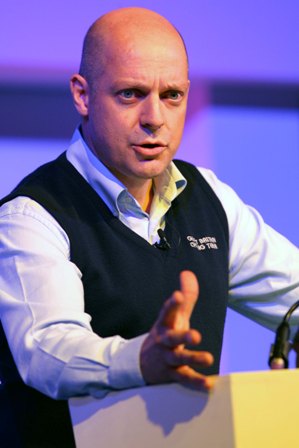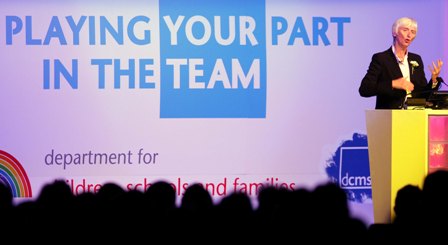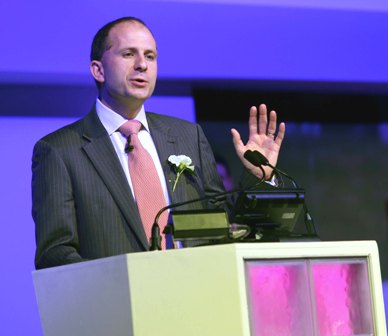
Dave Brailsford: sporting Midas
Part of the team
The Youth Sport Trust welcomed a large audience of sports development professionals to Telford for the 2008 School and Sport Partnership Conference. Ian Jackson was on hand to assess the implications for the world of sport

Dave Brailsford: sporting Midas
I wasn’t quite sure what to expect when I booked my place at the Youth Sport Trust’s School and Sport Partnerships Conference held in Telford on 15 and 16 October. As a ‘newbie’ senior competition manager and on the scene for just shy of six months, I figured I’d be surrounded by hordes of tracksuit-clad, ex-whistle-wearers in the shape of partnership development managers and school sports co-ordinators. And surely, as with all conferences, the emphasis would be on ‘networking’ and ‘sharing examples of best practice’, usually accompanied by a pint or two of ale and a selection of bar snacks. I wasn’t entirely wrong but some things surprised me nonetheless.
The first thing to strike me was the scale of the event. No fewer than 1,500 people poured into the International Centre on the first morning to digest the messages behind the theme ‘Playing Your Part in the Team’. And teamwork was certainly the key to success in the first task of the day, commonly known as ‘exhibitor raiding’. School sport partnerships descended into the marketplace en masse to relieve the stands of whatever freebies were being offered by the unsuspecting national governing bodies and other partners. Any exhibitor that dared to bring anything other than a selection of pens was treated to an experience akin to spending Boxing Day in Next as they were duly cleared out.
After the initial excitement it was time to get serious with both Steve Grainger and Baroness Campbell of Loughborough (sic) imploring the audience to recognise and celebrate the good work that has been achieved over the last few years by the YST ‘family’. That family continues to grow in number and stature, the most recent additions being the 225-strong network of competition managers and an additional 500 further education sports co-ordinators, or – inevitably – FESCos. Both Grainger and Campbell emphasised the need to ensure that both of these networks should not be treated as separate entities but fully integrated into the school sport partnerships.
Further messages invited delegates to continue to be innovative, with the emphasis on teamwork and co-ordination of effort. But it was when Grainger asked those present “to implement the national picture according to local priorities” that wry smiles could be seen appearing on the faces of competition managers around the room; no doubt they recalled the prescription that 80% of their time must be spent on the eight “priority sports”.
After a rapturous round of applause from the (it has to be said) smartly turned-out audience, we were entertained by the idiosyncratic but highly intelligent ramblings of Sir Clive Woodward. The instigator of England’s 2003 rugby world cup triumph was on fine form as he proceeded to welcome delegates to his world; a world where business meets sport and the success is well documented. Sir Clive had the audience in the palm of his hand as he taught us that talent alone is not enough and that champions think calmly under pressure; before introducing the concept of coaching to music. I, for one, will never be able to listen to Sophie Ellis-Bextor again without remembering that the most important element of golf is the grip. And I don’t even like golf.
However, few among the audience will have missed Sir Clive’s most salient assertion that he doesn’t believe in targets: “If everyone does what they’re supposed to then the desired outcomes will be achieved.” The gasps from among the YST staff at the front of the auditorium were almost audible as they contemplated the ensuing revolution.
The remainder of day one was given over to a series of pre-booked workshops and network tables, which should have afforded facilitators the opportunity to build on the positive vibes engendered by the earlier speakers. However, the allocated maximum of just one and a quarter hours for each learning experience meant discussion was limited, with most of the time generally spent listening to how a project or programme had been delivered in a completely alien part of the country; followed by a few questions. This was not what I had anticipated and I left each of the three workshops I attended over the two days feeling that I had not really learnt a great deal. The workshops were one aspect that could certainly be improved upon.
The conclusion of the first day, and the reward for all our efforts, was the annual awards dinner. Falling as it did on the same night as an England football fixture, some of the tables were missing a few deluded die-hards who opted for a basket of chips down the local pub. They clearly had no appreciation of what they were giving up: a well-executed allocation of seemingly random awards by Mr Grainger; the Baroness doing an uncanny impression of Parky as she quizzed Beijing medallists from among the ranks; and all to the back-drop of a DJ set of which Dave Pearce would have been proud.
Day two was a more traditional portrayal of conference life as tracksuits and polo shirts with upturned collars were in fashion among the seemingly bleary-eyed and fuzzy-headed delegates. Messrs Burnham, Grainger, Diaper and Steele from the DCMS, YST, Sport England (remember them?) and UK Sport respectively each gave their vision for sport in the next twelve months, with the emphasis once again on teamwork and co-ordination. La Campbell was enjoying the occasion and welcomed each of the speakers with an increasingly large smacker before, quite rightly, saving her warmest welcome of the conference for Dave Brailsford. Who knows what she would have done in the absence of an audience?
The man behind no fewer than eight British gold medals in Beijing was subjected to the biggest ovation of the conference, which he himself had to cut short for fear of not having the opportunity to convey his vast knowledge, enthusiasm and attention to detail in the pursuit of excellence. His message was a simple one: that the team needs to contain the right people if the common goal is to be achieved. The first question for any member should always be, “What could I have done differently to improve my performance?”
And that said it all really. As the delegates filed out to contemplate the journey home beyond the roundabouts of Telford, you could sense that people were left recognising that they had been part of something big and well-organised but perhaps something lacking an individual vision that would determine how the teachings of the conference would impact upon their daily lives. It remains to be seen whether the event will have a profound impact on the way in which the YST’s extended family works as a team or whether work will get in the way. I’m just glad that I took the opportunity to pilfer a couple of bags of freebies that will go some way to making me the best uncle ever.
Ian Jackson is senior competition manager with Suffolk County Council
The views expressed in this article are those of the individual and do not necessarily represent the views of the Youth Sport Trust or Suffolk County Council.
The Leisure Review, November 2008
© Copyright of all material on this site is retained by The Leisure Review or the individual contributors where stated. Contact The Leisure Review for details.

Sue Campbell: celebrating good work

Steve Grainger: urging integration